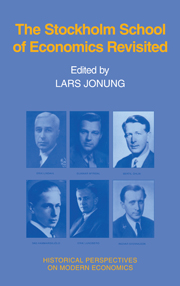Book contents
- Frontmatter
- Dedication
- Contents
- Preface
- List of Contributors
- Dramatis Personae at the end of 1937
- Introduction and Summary
- Part I The roots
- Part II The approach of the Stockholm School
- 4 Expectation and plan: The microeconomics of the Stockholm School
- 5 Sequence analysis and optimization
- 6 There were two Stockholm Schools
- 7 On formal dynamics: From Lundberg to chaos analysis
- 8 Lundberg, Keynes, and the riddles of a general theory
- 9 Macrodynamics and the Stockholm School
- 10 Ohlin and the General Theory
- 11 The monetary economics of the Stockholm School
- 12 The Austrians and the Stockholm School: Two failures in the development of modern macroeconomics?
- 13 The political arithmetics of the Stockholm School
- 14 After the Stockholm School
- Comment
- Comment
- Part III The impact of the Stockholm School
- Part IV What remains of the Stockholm School?
- The Stockholm School: A non-Swedish bibliography
Comment
Published online by Cambridge University Press: 05 July 2013
- Frontmatter
- Dedication
- Contents
- Preface
- List of Contributors
- Dramatis Personae at the end of 1937
- Introduction and Summary
- Part I The roots
- Part II The approach of the Stockholm School
- 4 Expectation and plan: The microeconomics of the Stockholm School
- 5 Sequence analysis and optimization
- 6 There were two Stockholm Schools
- 7 On formal dynamics: From Lundberg to chaos analysis
- 8 Lundberg, Keynes, and the riddles of a general theory
- 9 Macrodynamics and the Stockholm School
- 10 Ohlin and the General Theory
- 11 The monetary economics of the Stockholm School
- 12 The Austrians and the Stockholm School: Two failures in the development of modern macroeconomics?
- 13 The political arithmetics of the Stockholm School
- 14 After the Stockholm School
- Comment
- Comment
- Part III The impact of the Stockholm School
- Part IV What remains of the Stockholm School?
- The Stockholm School: A non-Swedish bibliography
Summary
I learned a good deal from Björn Hansson's paper, as I did from his book (Hansson, 1982), and I agree with his main conclusion, namely, that the ideas of the Stockholm School did not so much disappear from economics as lose their national identity when they became absorbed into the discipline's mainstream. Thus I have nothing in the way of adversely critical comments to offer, and of the three points I would like to make, two come in to the category of “suggestions for further work,” rather than bearing directly on the substance of Hansson's contribution.
Let me first deal with a matter that arises from the paper, however. Hansson suggests, at the very outset of his argument, that “after 1937 … the contributions [of the Stockholm School] are no longer isolated from foreign influences,” and he returns to this same theme later, for example, when discussing the work of Bent Hansen. One must be very careful when one speaks of the isolation of the Stockholm School, because throughout the first three decades of this century, it would be hard to find a group more aware of work going on elsewhere than the Swedes. A glance at Wicksell's Lectures will readily confirm that he was both one of the best read of his contemporaries, and also, particularly by the standards of his time, extremely conscientious about drawing his readers' attention to the work of others. The comparison here with Marshall, shall we say, is hardly to the credit of the latter.
- Type
- Chapter
- Information
- The Stockholm School of Economics Revisited , pp. 361 - 364Publisher: Cambridge University PressPrint publication year: 1991

